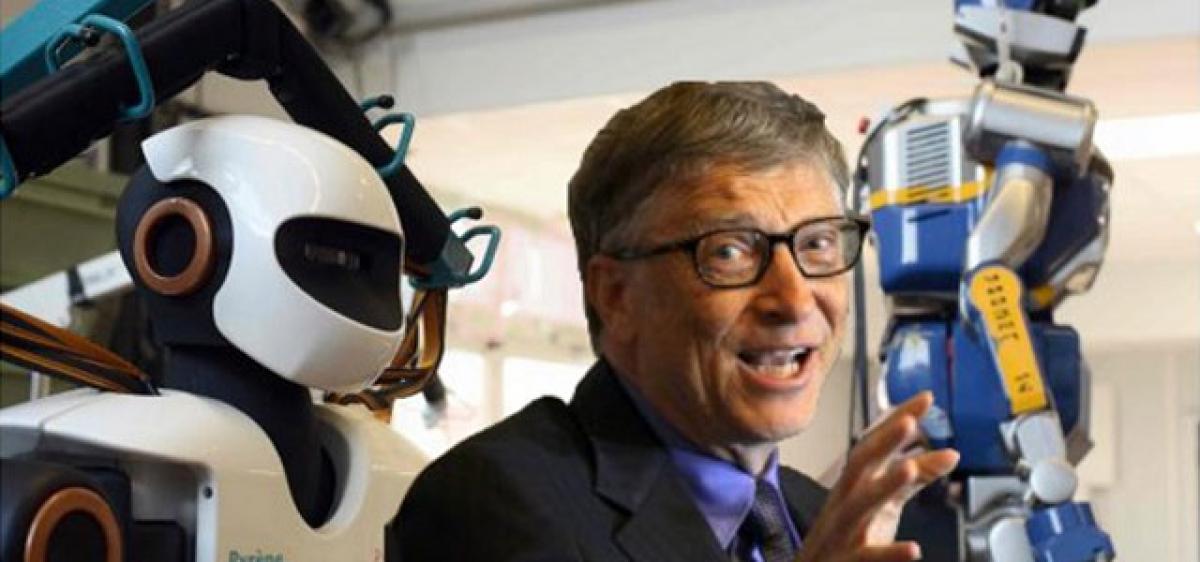Live
- Get Ready in Minutes with Wear and Go Wigs from RemyForte.com
- PM ‘cursing’ Congress out of despair: Maharashtra Cong Chief
- Applications are invited for Junior Colleges Scheme District Scheduled Castes Development Officer Ramlal
- A nomination was filed on the second day for the Nagar Kurnool parliamentary seat
- SP Gaikwad inspected the Telangana Amarnath Saleswaram Jatara yatra arrangements
- Rahul Gandhi's decision to contest from Wayanad shows 'lack of confidence': BJP President Nadda
- IPL 2024: Delhi bowlers will go after all of SRH’s top-order batters, says head coach Ricky Ponting
- At Amroha rally, PM Modi sends out ‘meaningful’ message for Muslims and Hindus
- Tripura records highest 79.83 pc voter turnout in Northeast
- The government has to clear the confusion
Just In

As advancing technologies like robots threaten displacing jobs for people, the suggestion by Microsoft founder Bill Gates to tax the robots is justifiably triggering a greater debate. Bill Gates’ argument is that the money so generated can finance the Universal Basic Income (UBI) to compensate for the social costs of automation.
As advancing technologies like robots threaten displacing jobs for people, the suggestion by Microsoft founder Bill Gates to tax the robots is justifiably triggering a greater debate. Bill Gates’ argument is that the money so generated can finance the Universal Basic Income (UBI) to compensate for the social costs of automation.
Despite its practicalities, the proposal certainly focuses on the social costs of automation. History is replete with examples of such concerns often raised at every stage of technological advancement. Similar apprehensions were aired at the dawn of computers. There were even trade union protests opposing the computerisation.
But, the experience reveals that computers revolutionised the economic processes, resulting in generation of more jobs. Similarly, all robots may not replace humans but may even perform jobs humans never did before. Such taxation may disincentivise technological progress causing productivity losses for the economy as a whole. Such a deceleration in the economy may in turn dampen employment prospects.
This is not to deny the disruptive potential of modern technology for the human jobs. But, instead of blocking the progress of technology, more innovative solutions to harness the power of it should be explored.
Meanwhile, the UBI can be funded by taxing the top one per cent of population as the grotesque inequalities rock the modern world. Robotisation would certainly make mundane jobs redundant. Societies should learn to brace up to the challenge through massive skilling of their population. Advances in artificial intelligence can solve many problems so far incomprehensible for human minds.
Yet, they can pose a threat of displacement to higher levels of human performance too. Not just the robots, any machinery ranging from simple machines to super computers would replace human effort. But, if one repudiates such advances, human civilisation would have got stuck at pre-industrial revolution era. Robots should be used to produce more, thereby creating greater wealth.
Then, national governments should evolve policies to ensure proper distribution of thus generated prosperity for the common good of the population. The idea of robot tax should be to push for such distributive justice in an era where the rich appropriates the technology for amassing wealth, while the worker suffers displacement.
But, it cannot be ignored that computer, smart phones and many such modern devices are no longer in the service of the rich. Any attempt to see them as symbols of class preserve is unwarranted. The negative externalities of automation certainly deserve attention of policy makers as technological development cannot be pyrrhic. The production and deployment of labour-absorbing technologies should get tax incentives.
Machine learning can make a large number of humans obsolete. For instance, driverless trucks can threaten over three million truck drivers in United States. Society is moving away from a phase of technology complementing human work. Society‘s ability to manage rapid pace of automation is, therefore, in question.
Automation can widen the inequalities between high and low skilled human resources with the former disproportionately benefiting at the cost of the latter. Cutting edge technologies are vital for boosting growth.
Taxing technology can impede innovation. But, the world should brainstorm on how to use policy to mitigate the disruption of automation.

© 2024 Hyderabad Media House Limited/The Hans India. All rights reserved. Powered by hocalwire.com







